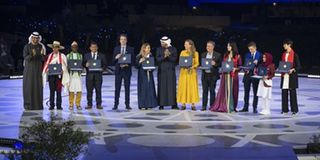African firms and schools honoured at COP28 climate summit in UAE

Winners of the Zayed Sustainability Prize at COP28 during the award ceremony in the United Arabs Emirates.
What you need to know:
- The Prize's eleven winners for the current cycle were elected in September by a distinguished panel of Jury members.
- The COP28 climate summit in Dubai has brought together representatives from almost 200 countries, including Kenya.
Two African SMEs and a Nigerian high school have emerged as the winners of sustainability awards during the ongoing United Nations Climate Change Conference, also known as COP28, in the United Arab Emirates (UAE).
The awards were presented by UAE President Sheikh Mohammed Bin Zayed Al Nahyan, who is hosting the COP28 climate summit.
The award, known as the Zayed Sustainability Prize, pays homage to the late founding father of the UAE, Sheikh Zayed bin Sultan Al Nahyan, by rewarding SMEs, NGOs, and high schools for their work addressing health, food, energy, water, and climate-related challenges.
According to the organisers, since 2009, the Prize has transformed the lives of 384 million people worldwide through its 106 previous winners.
Kelp Blue, a Namibian SME, was awarded the Prize in the Climate Action category for its ambitious efforts to cultivate large-scale kelp forests in deep waters, contributing to the restoration of ocean biodiversity while capturing 100,000 tonnes of CO2 annually and generating job opportunities in coastal communities.
Ignite Power, an SME from Rwanda, was awarded the Prize in the Energy category for its transformative efforts to provide affordable electricity to last-mile communities across Sub-Saharan Africa. Their pay-as-you-go solar solutions provided electricity to 2.5 million people and prevented 600,000 tonnes of CO2 emissions.
The Gwani Ibrahim Dan Hajja Academy in Nigeria was the high-school winners for Sub-Saharan Africa, having proposed a project to construct a solar dryer for smallholder farmers to prevent post-harvest losses and increase their income.
The project aims to train 300 students and 50 teachers as Solar Green Ambassadors. Students expect that 13,000 smallholder farmers and 200,000 community members will be directly impacted by the project, with as much as a 40 per cent income increase for farmers.
Promoting sustainability
These African winners will be among the firsts to receive the Prize’s increased its endowment, which has almost been double to reach $5.9 million (Sh890.9 million) total.
The larger fund is anticipated to expand the Prize’s support for innovative solutions that positively impact the environment and enhance the well-being and economic growth of the world's most climate-vulnerable communities.
Numerous heads of delegations participating in COP28, ministers, senior government officials, and Prize winners and finalists were present at the ceremony.
Sheikh Mohammed, also known as MBZ, congratulated the winners and commended their efforts in promoting sustainability, encouraging them to continue their important contributions in this field.
He emphasized UAE's commitment to sustainability, which was established by the late Sheikh Zayed bin Sultan Al Nahyan, the country's Founding Father.
He also highlighted the significant role of the Zayed Sustainability Prize in advancing sustainable development, serving humanity, and empowering innovators, entrepreneurs, and youth to actively contribute towards making a positive difference for the planet.
The Prize's eleven winners for the current cycle were elected in September by a distinguished panel of Jury members.
In the Health category, doctorSHARE from Indonesia won the Prize for its pioneering work in providing healthcare access to hard-to-reach areas, including barge-mounted floating hospitals.
Low-carbon future
Gaza Urban & Peri-urban Agricultural Platform (GUPAP) from Palestine won in the Food category for its contributions to supporting a more resilient agricultural sector in Gaza.
Eau et Vie, an NPO from France, won in the Water category for its contributions to ensuring access to clean water in impoverished areas by installing taps in urban homes.
In the Global High Schools category: Colegio De Alto Rendimiento De La Libertad (Peru) for The Americas; International School (Morocco) for the Middle East and North Africa; Northfleet Technology College (United Kingdom) representing Europe and Central Asia; KORT Education Complex (Pakistan) for South Asia; and the Beijing High School No. 35 (China) for East Asia and Pacific.
The COP28 climate summit in Dubai has brought together representatives from almost 200 countries, including Kenya.
The UAE, as the host of the conference and a member of OPEC, aims to promote a low-carbon future that incorporates fossil fuels rather than rejecting them.
During his speech at the climate summit, President William Ruto urged nations to establish clear and actionable plans that will transform Africa into a green powerhouse.
He emphasized that economic growth and environmental sustainability are not mutually exclusive and called for a unified global effort to mobilize capital for both development and climate action.
He also stressed that ignoring Africa's developmental needs and failing to invest in its youth is no longer a viable argument.




